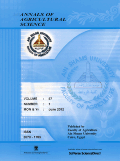
ANNALS OF AGRICULTURAL SCIENCES
Scope & Guideline
Empowering the Agricultural Community Through Open Access Research
Introduction
Aims and Scopes
- Sustainable Agriculture Practices:
Research aimed at developing and promoting agricultural practices that are environmentally friendly, economically viable, and socially responsible, including organic farming, conservation tillage, and agroecology. - Crop Management and Improvement:
Studies that focus on enhancing crop yield and quality through genetic improvement, nutrient management, and innovative farming techniques, including precision agriculture and integrated pest management. - Soil Health and Fertility:
Exploration of soil management practices that enhance soil health, nutrient cycling, and fertility, including the use of organic amendments, biochar, and crop rotation strategies. - Pest and Disease Management:
Research on biocontrol methods, resistant varieties, and integrated pest management strategies to mitigate the impact of pests and diseases on crop production. - Food Quality and Safety:
Investigation into the nutritional quality, safety, and preservation of agricultural products, focusing on postharvest practices and the use of natural preservatives. - Environmental and Ecological Impact:
Studies assessing the environmental impacts of agricultural practices, including soil and water conservation, biodiversity conservation, and the effects of climate change on agriculture.
Trending and Emerging
- Climate Resilience and Adaptation:
Research focusing on developing agricultural practices that enhance resilience to climate change, including studies on drought-tolerant crops and adaptive management strategies. - Biological Control and Probiotics:
An increasing interest in biological control agents and probiotic applications in agriculture, highlighting the role of beneficial microorganisms in enhancing plant health and soil fertility. - Nutrient Use Efficiency:
A growing emphasis on optimizing nutrient use efficiency in crops, including studies on enhanced efficiency fertilizers and practices that minimize nutrient runoff. - Functional Foods and Nutraceuticals:
Research exploring the potential of agricultural products as functional foods, with a focus on health benefits and the nutritional enhancement of crops. - Technological Innovations in Agriculture:
The integration of advanced technologies such as precision agriculture, remote sensing, and data analytics in farming practices is emerging as a significant trend, aimed at increasing efficiency and productivity.
Declining or Waning
- Traditional Agricultural Techniques:
Research focusing on traditional farming methods appears to be declining, possibly due to the increasing emphasis on modern technologies and sustainable practices that offer greater efficiency and productivity. - Chemical Pesticides and Fertilizers:
There is a noticeable decrease in studies advocating for the use of chemical pesticides and synthetic fertilizers, as the agricultural community shifts towards organic and integrated pest management approaches. - Single Crop Systems:
The focus on monoculture systems is waning as research increasingly emphasizes crop diversification and intercropping methods that promote ecological balance and resilience. - Non-innovative Water Management Practices:
Studies related to outdated water management practices are becoming less frequent, reflecting a broader shift towards innovative irrigation techniques that enhance water use efficiency in agriculture.
Similar Journals

Zemdirbyste-Agriculture
Cultivating innovation in agronomy and crop science.Zemdirbyste-Agriculture is a prominent journal dedicated to advancing the field of agricultural sciences, with a particular focus on agronomy and crop science. Published by the Lithuanian Research Centre Agriculture & Forestry, this open access journal has been fostering knowledge sharing and scientific discourse since 2004, allowing researchers, professionals, and students unrestricted access to its content. Located in the beautiful country of Lithuania, specifically at Vytautas Magnus University, this journal plays a significant role in disseminating innovative research findings. With a 2023 Scopus ranking of #246 out of 406 in the category of Agricultural and Biological Sciences, Zemdirbyste-Agriculture falls within the Q3 quartile, reflecting its growing influence in the academic community. This journal, which has converged its publication focus from 2008 to 2023, aims to provide a platform for scientists to share their critical insights on agricultural practices, sustainability, and technological advancements in crop science, thereby contributing to the global discourse on food security and environmental health.
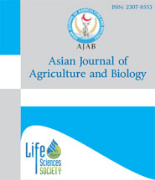
Asian Journal of Agriculture and Biology
Showcasing groundbreaking research for global agricultural and biological progress.Welcome to the Asian Journal of Agriculture and Biology, a premier open access journal published by LIFE SCIENCES SOC PAKISTAN, dedicated to advancing research in the fields of agricultural and biological sciences. Since its inception in 2013, this journal has provided a vital platform for scholars and practitioners to disseminate novel findings and innovative methodologies that contribute to the betterment of agricultural practices and biological research. With an impressive H-Index and ranked in the Q3 category across multiple disciplines including Agricultural and Biological Sciences, Biochemistry, Genetics, and Molecular Biology, as well as Medicine, the journal showcases high-quality research that influences both academic and practical applications globally. The journal is indexed in Scopus, reinforcing its commitment to high academic standards and providing researchers with efficient access to significant knowledge. Based in Pakistan, the Asian Journal of Agriculture and Biology is your gateway to staying abreast of the latest trends and discoveries that support sustainable development and health sciences.

Revista Ciencia Agronomica
Advancing agricultural knowledge for a sustainable future.Revista Ciencia Agronomica is a leading open access journal published by the Universidade Federal do Ceará, Departamento de Geociências, dedicated to advancing the field of agricultural sciences. Established in 2008, the journal has emerged as a significant platform for the dissemination of original research and innovative advancements in areas including agronomy, horticulture, and soil science, with a dedicated convergence of years extending to 2025. With an impactful presence in academic circles—ranking in Q3 for Agronomy and Crop Science and Soil Science and Q2 for Horticulture in 2023—this journal provides vital insights for researchers and practitioners alike. Although specific HIndex metrics are currently unavailable, the journal's Scopus rankings attest to its relevance, placing it in the 52nd, 44th, and 43rd percentiles across multiple pertinent categories. Since transitioning to an open access model in 2010, Revista Ciencia Agronomica has committed to maximizing the reach and impact of its published work, thereby ensuring valuable contributions to global agricultural knowledge.
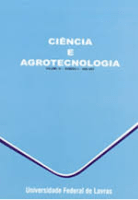
CIENCIA E AGROTECNOLOGIA
Advancing Agricultural Innovation for a Sustainable FutureCIENCIA E AGROTECNOLOGIA, published by UNIV FEDERAL LAVRAS-UFLA, is a vital open-access journal since 2005 that serves as an influential platform for disseminating research in the fields of Agronomy, Animal Science, Food Science, Soil Science, and Veterinary Science. With its ISSN 1413-7054 and E-ISSN 1981-1829, this journal is recognized for its contribution to science and technology advancements in agriculture, particularly in Brazil, fostering knowledge exchange among researchers, professionals, and students. Currently ranked in the Q2 quartile for Agronomy and Crop Science, Animal Science and Zoology, and in the Q3 quartile for Food Science and Soil Science, it demonstrates a solid international standing in the relevant Scopus indices. The journal's commitment to open access ensures that critical research findings are freely available, enabling a broader impact and encouraging collaborative advancements in agritech. As the journal looks towards its converged years from 2007 to 2024, it continues to uphold its objectives of promoting sustainable practices and innovation within the agricultural sciences.
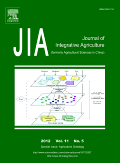
Journal of Integrative Agriculture
Fostering Collaboration for Agricultural ExcellenceJournal of Integrative Agriculture, published by Elsevier Science Ltd, stands as a leading platform for innovative research at the intersection of agricultural sciences. With a significant focus on integrative approaches, this journal has established itself within the academic community, reflecting its excellence through impressive Impact Factor rankings and a consistent Q1 category status in multiple fields, including Agronomy, Animal Science, and Ecology. The journal spans a wide range of topics, making it a critical resource for exploring advancements in Biochemistry, Food Science, and Plant Science. With its diverse Scopus rankings—from Rank #3 in Food Animals to Rank #14 in Animal Science—it serves as a vital repository for cutting-edge research that influences both scientific inquiry and practical applications in the agricultural domain. Operating from China and accessible through open access options, the Journal of Integrative Agriculture aims to foster collaborative research and knowledge exchange among scientists, professionals, and students worldwide, supporting the growth and sustainability of agricultural practices.

Agrarforschung Schweiz
Driving progress in agriculture through open access and shared knowledge.Agrarforschung Schweiz is a premier journal dedicated to advancing the fields of agronomy, animal science, food science, and environmental studies. Published by AGRARFORSCHUNG in Switzerland, this journal serves as a vital platform for the dissemination of research findings that address contemporary challenges in agriculture and food systems. With an emphasis on open access, researchers and practitioners are encouraged to share their work, fostering a collaborative environment for knowledge exchange. Although currently listed in Q4 of several agricultural categories, the journal is poised for growth and aims to enhance its impact within the academic community. It features a wide range of topics from innovative agricultural practices to sustainability and pollution management, catering to a diverse audience of researchers, students, and industry professionals. Given the rich agricultural heritage of Switzerland, Agrarforschung Schweiz aspires to contribute meaningfully to global discussions and advancements in agricultural sciences through rigorous peer-reviewed research and insights.

Romanian Agricultural Research
Advancing Agricultural Science for a Sustainable FutureRomanian Agricultural Research is a prominent academic journal dedicated to advancing the field of agricultural science with a specific focus on agronomy and crop management. Published by the NATL AGRICULTURAL RESEARCH & DEVELOPMENT INST in Romania, this journal has established itself as an important resource within its discipline, evidenced by its Q3 ranking in the Agronomy and Crop Science category for 2023. With its ongoing publication since 2008, the journal provides a platform for researchers and professionals to disseminate their findings and share innovative practices that address the challenges faced in agricultural development. Although it operates under a non-open access model, Romanian Agricultural Research commits to rigorous peer-review processes, ensuring the high-quality content that enhances the academic community’s knowledge base. The journal's objective is to foster dialogues surrounding sustainable agriculture, improve crop yield, and contribute to the enhancement of agricultural practices globally. Researchers, professionals, and students will find this journal to be an invaluable repository of knowledge and a catalyst for future agricultural innovations.
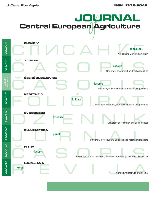
Journal of Central European Agriculture
Cultivating Insights in Crop and Animal SciencesThe Journal of Central European Agriculture, with ISSN 1332-9049 and E-ISSN 1332-9049, is an esteemed platform published by UNIV ZAGREB, FAC AGRICULTURE that caters to the dynamic fields of agronomy, crop science, and animal science. Since its establishment in 2000, this Open Access journal has played a crucial role in disseminating critical research findings while fostering collaboration among academics, researchers, and professionals within the agricultural community. The journal, which is based in the heart of Croatia, spans a rich history of scholarship, with its content available for free to readers and contributors alike. As reflected in its current standings, the journal has achieved a Quartile 3 ranking in Agronomy and Crop Science and Quartile 4 in Animal Science and Zoology for the year 2023, indicating its growing influence within these disciplines. With Scopus ranks placing it in the 32nd percentile among its peers, the Journal of Central European Agriculture is committed to advancing agricultural sciences not only in Central Europe but globally as it prepares for its converged years from 2007 through 2024. This journal serves as a vital resource for innovative research, practical applications, and a deeper understanding of agricultural challenges and solutions.
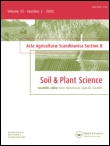
ACTA AGRICULTURAE SCANDINAVICA SECTION B-SOIL AND PLANT SCIENCE
Nurturing Innovation in Soil and Plant Research for Global ImpactACTA AGRICULTURAE SCANDINAVICA SECTION B-SOIL AND PLANT SCIENCE, published by Taylor & Francis AS, is a distinguished journal dedicated to the fields of Agronomy, Crop Science, and Soil Science. With an impressive impact factor, and categorized in Q2 for both Agronomy and Crop Science and Soil Science as of 2023, this journal is an essential resource for researchers, professionals, and students aiming to advance their understanding of soil-plant interactions and sustainable agricultural practices. Operating since 1992 and continuing through to 2024, ACTA aims to publish high-quality, peer-reviewed research that encourages the applicability of advanced scientific knowledge in real-world agricultural settings. While the journal is not open access, it remains widely accessible through institutional subscriptions, reflecting its commitment to disseminating essential findings and fostering innovation in soil and plant science worldwide. Nestled in the vibrant academic environment of Norway, ACTA AGRICULTURAE SCANDINAVICA serves as a key platform for nurturing groundbreaking research that informs sustainable agricultural policies and practices globally.
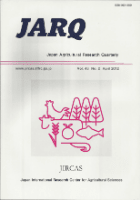
JARQ-JAPAN AGRICULTURAL RESEARCH QUARTERLY
Bridging Science and Sustainability in AgricultureJARQ - Japan Agricultural Research Quarterly serves as a pivotal platform in the field of agricultural sciences, published by the esteemed Japan International Research Center for Agricultural Sciences. Established in 1973, this journal has a rich history and plays a critical role in disseminating significant research findings relevant to agronomy, crop science, animal science, ecology, and biotechnology. Despite its ranking in the lower quartiles, with impressive coverage from 1973 to 2024, it continues to attract contributions that enhance agricultural strategies and practices in Japan and beyond. The journal facilitates discussions that are essential for fostering innovation in agricultural methodologies and environmental sustainability. Accessible to a diverse audience, including researchers, academics, and practitioners, JARQ emphasizes the importance of advancing agricultural research and its implications for food security and ecological balance.